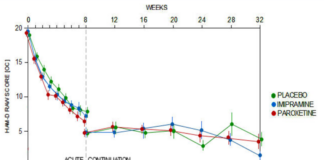Tag: psychiatric medication and suicide
Three Suicides: Honoring Lives Lost to Benzodiazepines
I am still trying to reconcile what these chemicals are capable of, how the urge can morph into an action, how we maybe just don’t understand suicide all that well. For me, the suffering was so intense it was too painful to stay alive. I understand how my friends felt in their last moments.
Study 329 Taper Phase
Most doctors still affect surprise at the idea SSRIs might come with withdrawal problems. Regulators knew very clearly since 2002 about the problems, but have decided to leave any communication of these issues in company hands.
Study 329 Continuation Phase
All the fuss about Study 329 centers on its 8-week acute phase. But this study had a 24-week Continuation Phase that has never been published. Until Now.
Rising Rates of Suicide: Are Pills the Problem?
If you’ve read recent reports that state “US suicide rates surge to a 30 year high,” you might first justify the reality with the fact that things feel very wrong in our world today. On a personal, national, and planetary level, people are suffering to survive and the distress is coming from all sides – medical to economic to existential. But you probably also wonder why more people are choosing this permanent and self-destructive path, and feel compelled to submit to seemingly logical appeals to provide these individuals more help and greater access to treatment. Surprise: that may be the last thing our population of hopeless and helpless needs. Life’s inevitable challenges are not the problem. It’s the drugs we use that are fueling suicide.
Restoring Study 329: Letter to BMJ
When we set out to restore GSK’s misreported Study 329 of paroxetine for adolescent depression under the RIAT initiative, we had no idea of the magnitude of the task we were undertaking. After almost a year, we were relieved to finally complete a draft and submit it to the BMJ, who had earlier indicated an interest in publishing our restoration. But that was the beginning of another year of peer review that we believed went beyond enhancing our paper and became rather an interrogation of our honesty and integrity. Frankly, we were offended that our work was subject to such checks when papers submitted by pharmaceutical companies with fraud convictions are not.
Organized Denial: Psychiatry’s Quiet Desperation
Peter Gøtzsche’s new book, Deadly Psychiatry and Organized Denial brings up an important and complex issue. How do psychiatrists get up in the morning and damage people all day long while pretending to help them? The book is elegantly referenced – and I encourage everyone who practices thoughtful psychiatry to read it, because you need to be much better educated to practice high-quality mental health than you do to act as a dispensing machine. Gøtzsche is absolutely right; on all levels psychiatrists are in denial about the damage that they are doing to patients.
Study 329: 50 Shades of Gray
Access to data is more important than access to information about conflicts of interest. It is only when there is access to the data that we can see if interests are conflicting and take that into account. Problems don’t get solved unless someone is motivated for some reason. We need the bias that pharmaceutical companies bring to bear in their defense of a product, along with the bias of those who might have been injured by a treatment. Both of these biases can distort the picture but it’s when people with differing points of view agree on what is right in front of their noses that we can begin to have some confidence about what we have.












